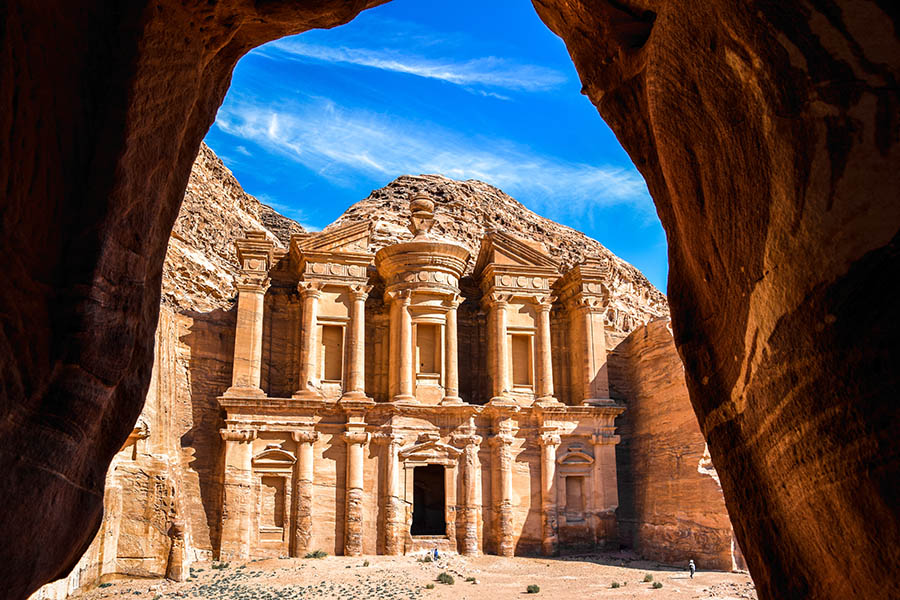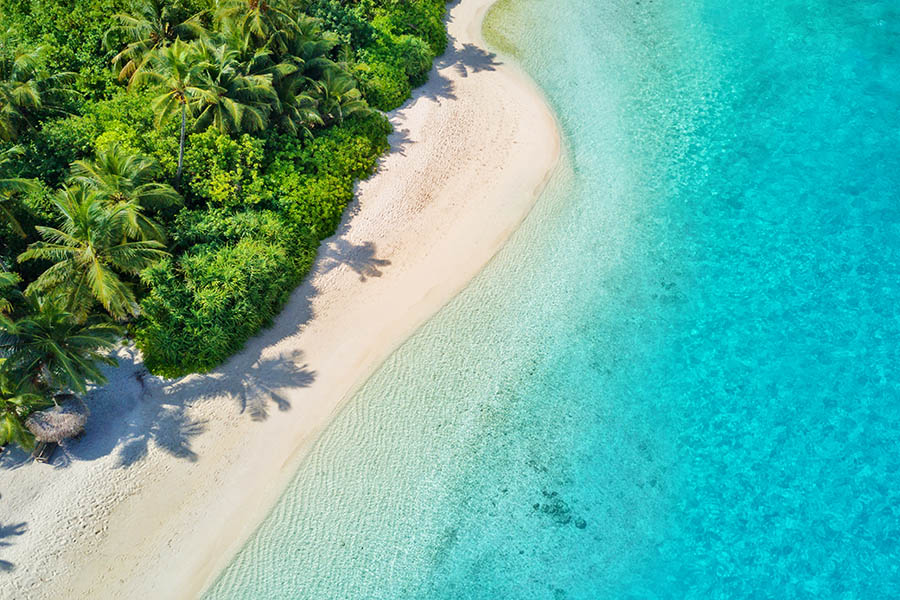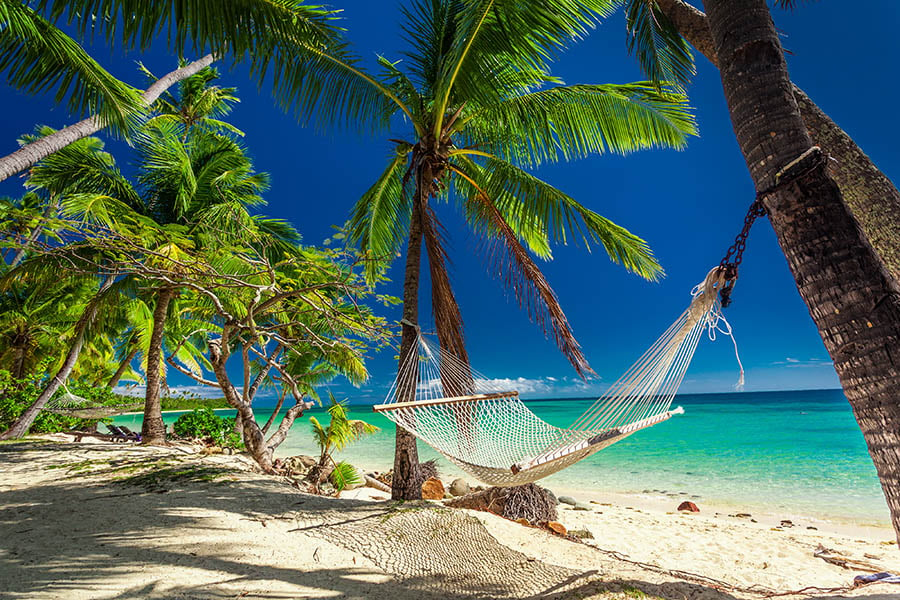Local island hopping in the Baa Atoll, Maldives
Famous for its beautiful and plentiful island resorts, the Maldives is not commonly known for its cultural experiences. A place of luxury, relaxation and water-based activities, most travellers head straight to the resorts and miss the chance to experience the local side of life.
I stayed in two high-end resorts when I first visited the Maldives 14 years ago. This time around, I was lucky enough to spend a week discovering the real Maldives. This gave me the chance to delve beneath the glitz and glamour of the resorts and learn about true island living.
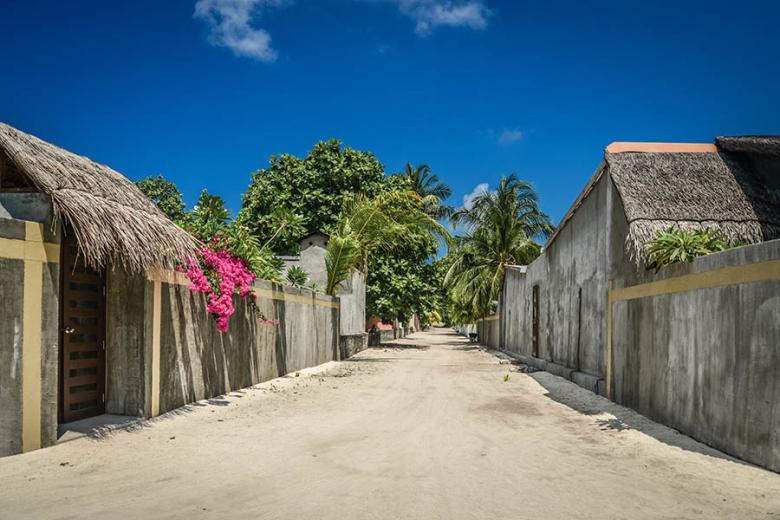
Sustainable island-hopping in the Maldives
We visited the Baa Atoll, staying on residential islands in small locally owned hotels amongst the local villagers. During the week, we participated in all kinds of experiences from beach cleans to snorkelling, diving, village visits, cooking classes and giving back to the communities. It was very educational, with presentations about whale sharks, coral regeneration, and climate impact.
I quickly learned that it is possible to go island hopping in the Maldives in a sustainable way, where nearly all the money you spend will help the local economy, which is so important. In short, there is far more to the Maldives than all-inclusive overwater bungalows and it’s a fascinating destination to explore.
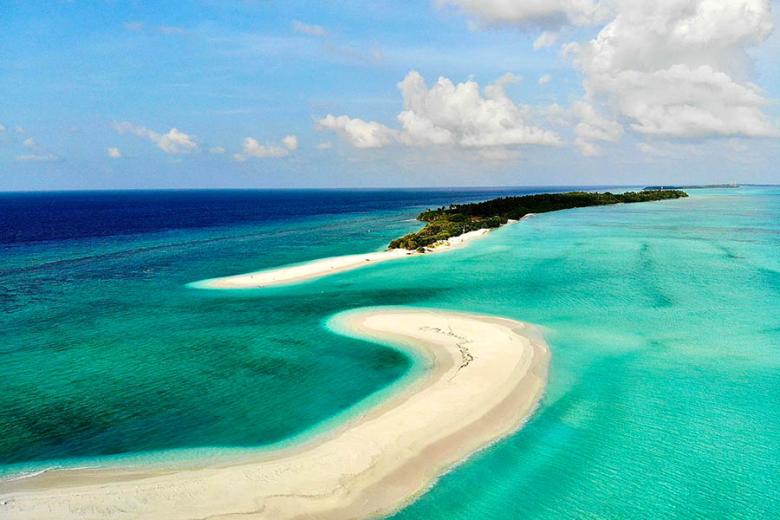
Arriving in the Maldives
Flying into the Maldives is a stunning and truly unique experience. As the plane drops below the clouds, you see a country made up of thousands of islands and atolls, all dotted with coral reefs. A whopping 99% per cent of the Maldives is water, and the average altitude is just 1.5m, the lowest of any country. The highest point in this island nation is just 7 metres above sea level. There really is nowhere like it.
As you fly, you see the vast blue ocean scattered with coral reefs and small islands with palm trees and pristine sand banks. The colour of the water is out of the world – it looks as though it’s been photoshopped! ‘Unreal blue’ became the catchphrase of our trip. You need to see it to believe it!
Goidhoo Island
After arriving at Male in the morning, we took a public speedboat to Goidhoo Island on the Baa Atoll, two hours north of the city. Checking into the locally owned Olive Hotel, I was pleasantly surprised with the room. It was clean, comfortable, and air-conditioned, with its own balcony. This is not 5-star luxury, so there is no pool or spa, but who needs a pool when you have the stunning Indian Ocean a few steps from your door?
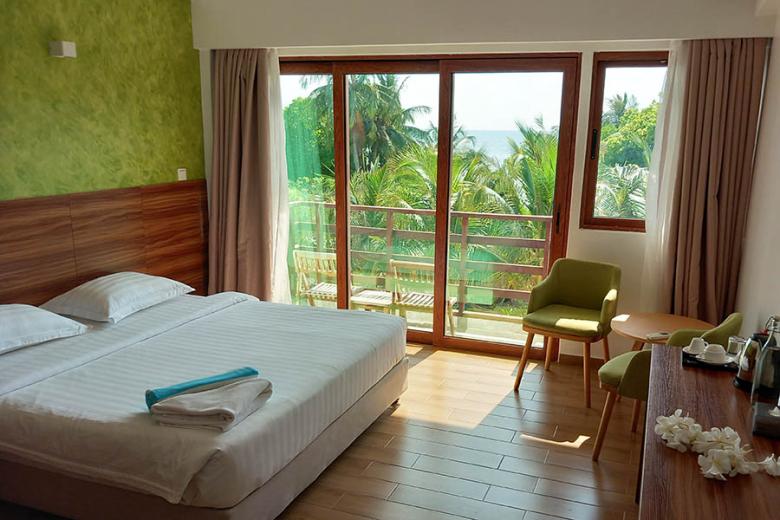
Once we had settled in, we set off to the local village cafe for Hedika, a traditional afternoon selection of sweet and savoury tapas type snacks. We quickly learnt that tuna, in different guises, features heavily in almost every meal in the Maldives!
Walking back to the hotel, we passed the main centre where adults and children were playing football and beach volleyball. The facilities were far better than I expected. Every island has a health centre, a school, an astroturf pitch, a telecoms mast for phones, and WiFi. We joined in with the local volleyball game and very quickly proceeded to bring the standard down a few levels.
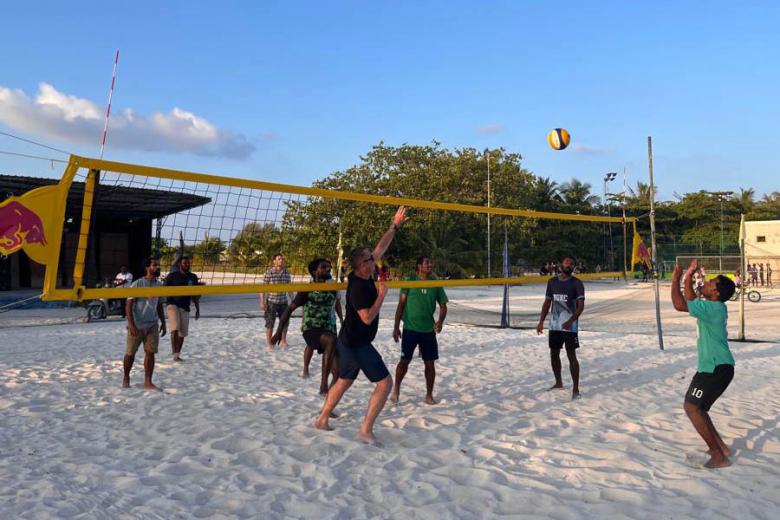
Exploring beneath the waves
The next day started with a morning snorkel - our first experience of the underwater beauty of the Maldives. We took a boat trip to three different sites, allowing the strong current to drift us along. The water temperature is around 32 degrees, which is incredibly warm.
Sadly, the knock-on effect of this global warming is that many of the reefs have been bleached and damaged. However, the marine life is still very abundant still we were lucky enough to see two hawksbill turtles, two nurse sharks and thousands of colourful fish.
After a lunch and some chill-out time to escape the main heat of the day, we took a village tour. We visited the the old mosque and walked to a truly spectacular beach on the far end of the island, where we watched the sunset while we floated in the bathtub-like water.
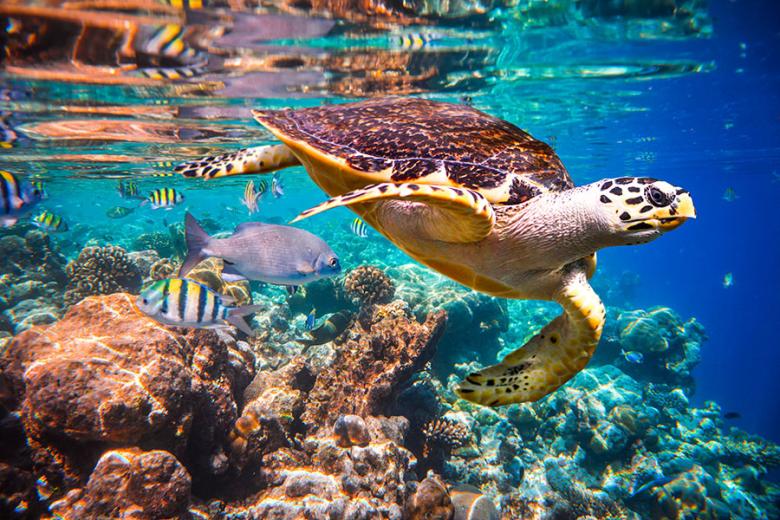
Coconuts and kayaking
This morning, we paid a very memorable visit to some locals who shimmied up a palm tree with guile and strength to collect some coconuts for us. There is something truly amazing about drinking fresh coconut water, along with other local juices and new tropical fruits.
Next, we spent an hour kayaking around a mangrove lake, where we see a huge number of beautiful flying fox bats, some with wingspans of three to four feet! We also saw stingray and flying fish, so it was a brilliant morning all round!
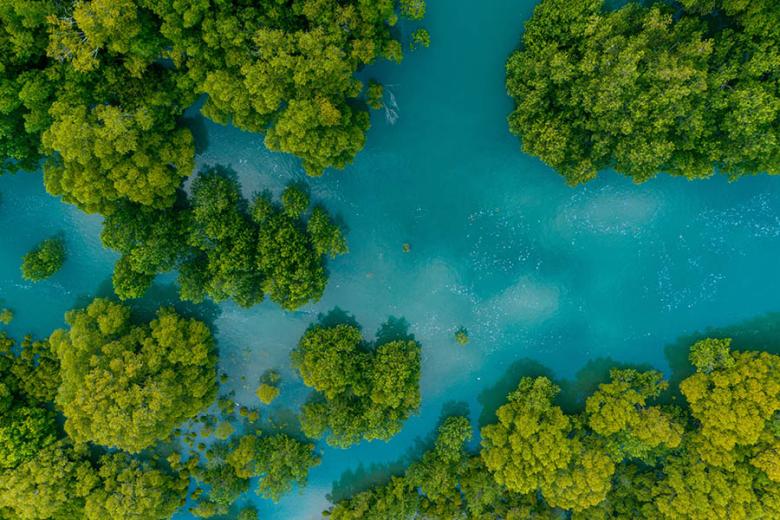
Fehendoo Island
After a quick lunch, we took a very quick boat transfer to the next island, Fehendoo. The journey took all of two minutes. We stayed at the very welcoming Sama Garden Guesthouse and, following a village tour, we walked to the beautiful beach at the far end of the island in about 20 minutes. There, we chatted with a handful of locals and saw some good coral and fish a short swim from the shore.
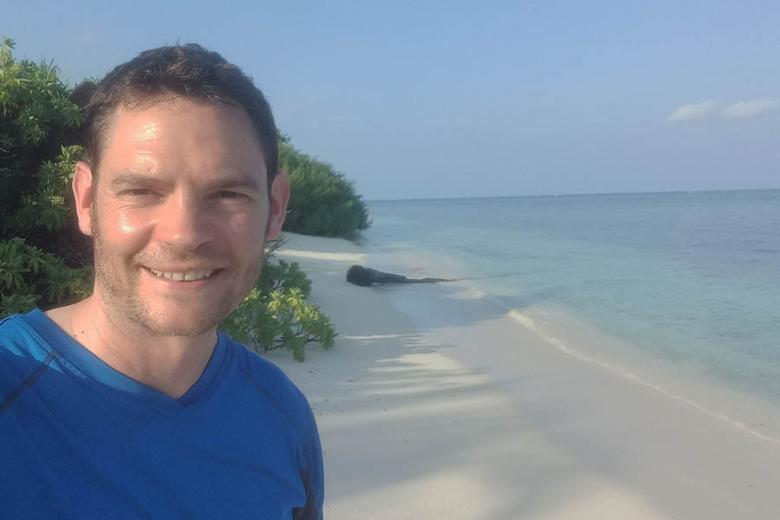
Snorkelling with dolphins
The day began with a truly fantastic drift snorkel trip, where the current carried us two kilometres. For the first time in my life, I saw a pod of ten dolphins swim past whilst in the water. Unfortunately, they didn’t stop to play, but it was an incredible sight - something I have always dreamed of. We also spotted four turtles, a Napoleon wrasse, and loads of fish. The coral was in decent condition but with some damage and bleaching.
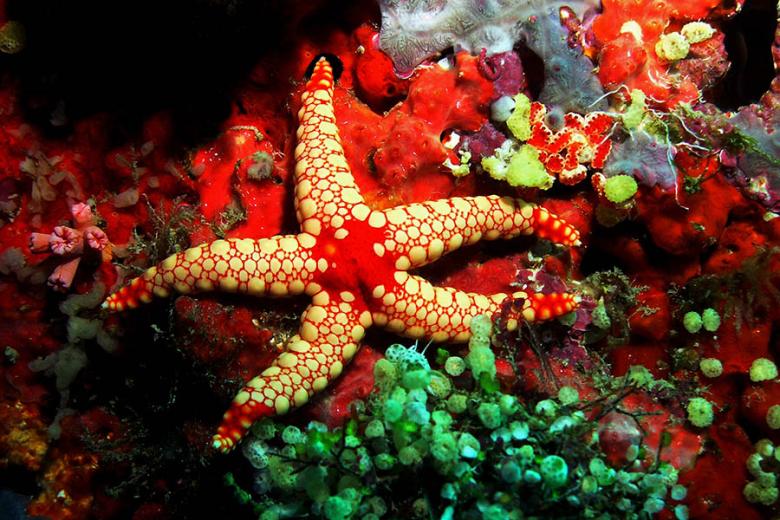
Fulhadhoo Island
After the snorkelling trip, we had lunch before setting off on a slightly longer boat journey to Fulhadhoo Island (10 minutes). Here, we stayed at Island Luxury Dive Resort, which has only just opened.
We enjoyed a peaceful forest walk to stunning Thundi Beach for sunset, which has recently been voted among the world’s top 25 beaches. We saw more tourists here than on the other two islands, where we didn’t see any tourists at all! Even at Thundi Beach, there were only a handful of tourists. It was lovely to be in areas where the local people live.
On Fulhadhoo Island, we had more time for swimming and relaxing. We also made a great team effort to remove some ‘ghost nets’, which are discarded fishing nets that can be deadly to marine life by trapping them in their mesh. Luckily, all fish in the Maldives are caught with a line or rod, and there are no trawling nets allowed.
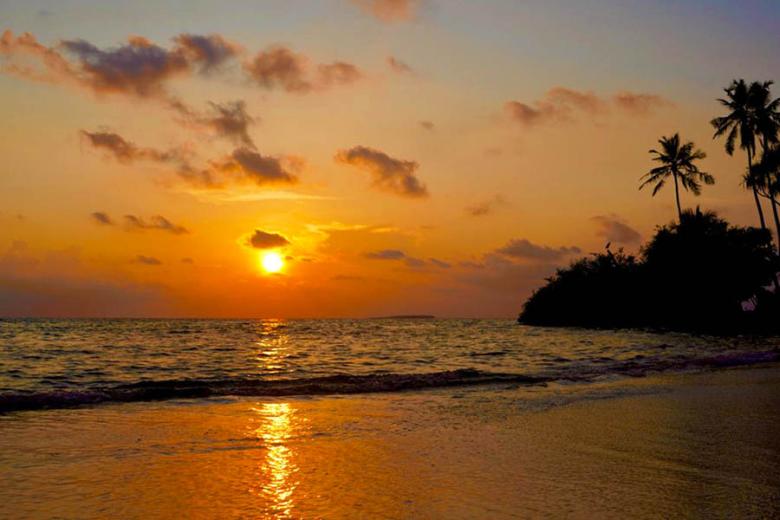
Cooking classes and beach cleans
This was by far my favourite day of the trip. We started off by learning how to make Mashuni Roshi with some women from the local Women’s Development Committee. This is a typical Maldivian breakfast dish made of tuna, onion, coconut, chilli and roshi (flatbread).
After devouring our homemade breakfast, we set off to go scuba diving in the lagoon. It was great to see a healthy reef! Due to local geographical factors such as strong currents, the Baa Atoll is home to some of the best reefs in the Maldives. Alas, there were no manta rays, we but loads of tropical fish and huge pillars of coral.
In the afternoon, we took a boat trip out to a sandbank in the middle of the ocean for swimming before fishing for our own dinner. We managed to catch five fish using handlines off the boat and enjoyed a wonderful Robinson Crusoe-style BBQ on a nearby uninhabited island. It was magic!
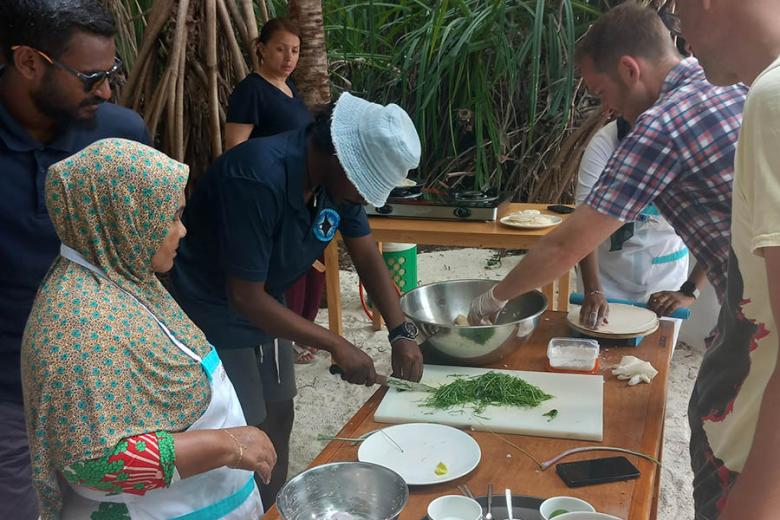
To earn our dinner, we collected two huge sacks of rubbish and plastic bottles. It’s so sad to stunning islands and beaches affected by littering but, unfortunately, it’s the reality of the world we live in. It does really hit home that we all need to put in the effort to reduce plastic waste and help clean up, wherever we are in the world.
Back home, we try and pick up a few bits of rubbish when we are at the beach or exploring the South Downs, and we also join community monthly beach cleans. If everyone did this, it would have a huge collective compart.
After dinner, we were given a fascinating coral presentation by Sendi, a celebrity of Maldivian scuba diving. He was the first local to become a diving instructor nearly 35 years ago and his knowledge of the ocean is incredible.
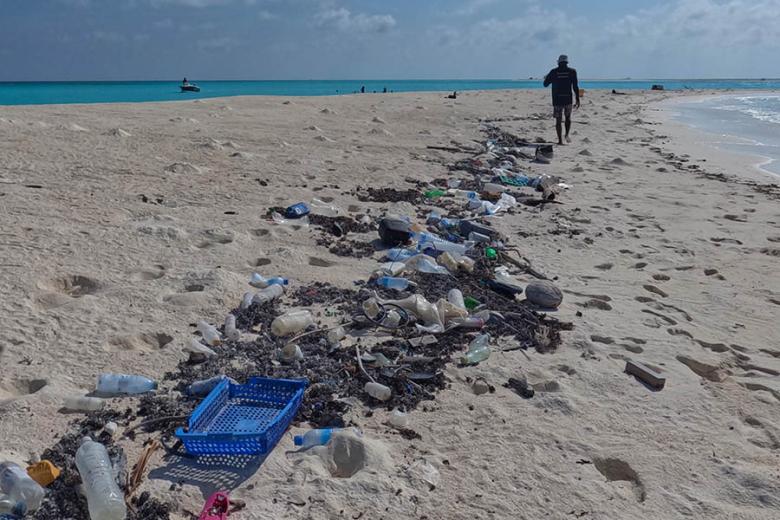
Exploring a coral nursery
The next day, we set off in the morning to visit the coral nursery with Sendi. Seeing firsthand the amazing work and huge growth of the coral really gives me hope that the coral can be restored. However, this can only happen if sea temperatures stop continuing to rise.
I always thought coral was incredibly slow growing, but it had already grown 12 inches in just 6 months! It was incredible to see how well it was establishing, in beautiful bright colours like reds, yellows and electric blues.
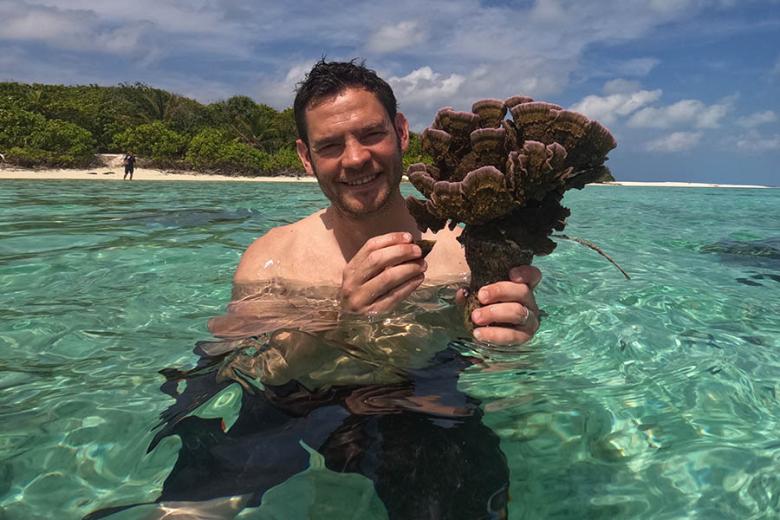
A recent NOAA (National Oceanic and Atmospheric Administration) report has just highlighted a worrying peak in global sea temperatures that has been sustained for nearly two months, which threatens these fragile ecosystems even more. It does seem that some corals are becoming more resilient, but in the nurseries, they need constant care from people, to clean off algae and keep them alive.
Later, we took part in another community beach clean. Again, we quickly filled a few sacks with rubbish and plastic. We finished the day with a sunset catamaran cruise although we were caught in a dramatic storm with thunder and lightning. It was definitely atmospheric, with dazzling forks of lightning flashing from the sky, but luckily was a few miles away from us.
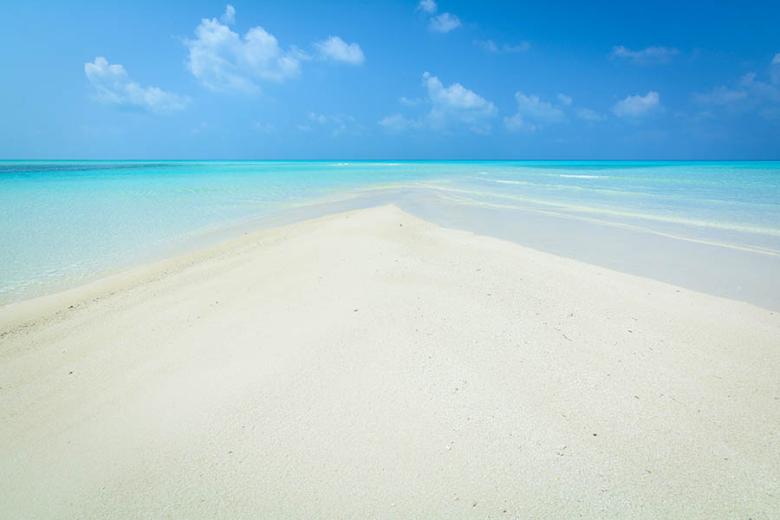
Discovering Male
On our final day, we took a private speedboat back to Male in the morning. We had a half-day city tour before taking the ferry across to Villimale, where we spent time with volunteers from Save the Beach NGO. This NGO played a big part in halting development on the island, preserving natural beaches and establishing a coral nursery.
We ended the trip with a great night watching Baibalaa, a local game similar to Kabaddi in India. We watched the final match of a weeklong tournament, and we were the only foreigners out of a couple of thousand fans. Unfortunately, the local team lost, but it was an exciting game with very lively fans, which made a great end to the trip.
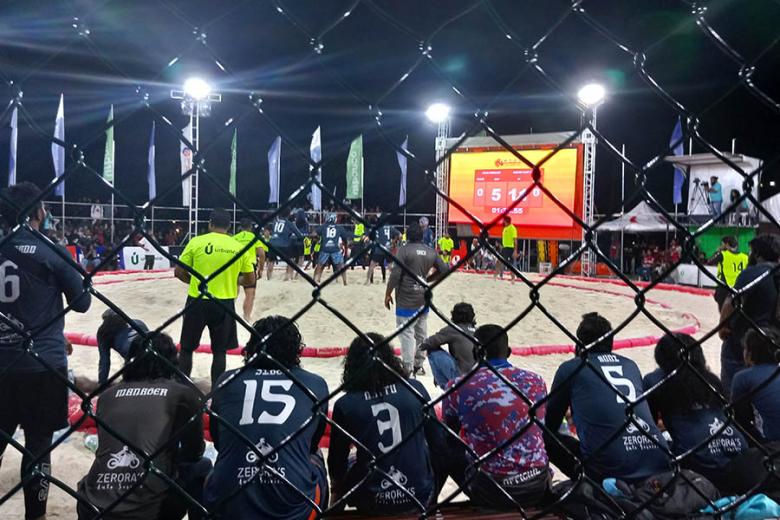
My thoughts about local travel in the Maldives
Overall, I loved my island-hopping Maldives trip. It’s an incredibly beautiful destination and I really enjoyed the mixture of water-based and cultural activities. I felt as though I got an honest taste of local hospitality and daily life, which is not something you can experience if you stay in a resort. It felt as though I was experiencing the real Maldives, and seeing beyond the superficial island holiday resorts where everything is pristine.
At many of the high-end island resorts we all associate with the Maldives, the staff clean the beaches two to three times a day, to make them ‘picture perfect’. During the process, they often remove seagrass, which is vital as a carbon store, protecting the beaches and islands and providing habitat for wildlife. A lot of the money from international resorts also leaves the country and does not benefit locals.
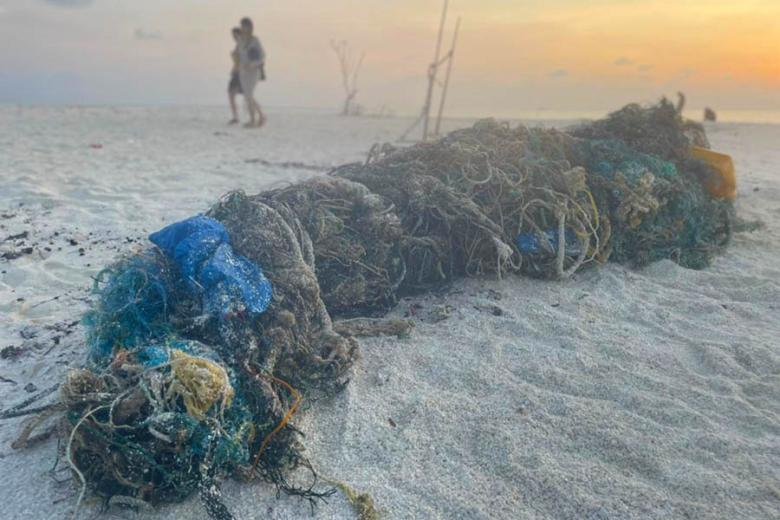
I loved learning about the marine life of the Maldives, and I was also shocked to see the effects of climate change firsthand. As such as low-lying country, Maldives is on the frontline when it comes to rising sea levels, so it really highlights the issues we face as a planet. Watching rubbish being swept up onto glorious beaches was also hard and, even snorkelling, I often filled my pockets with plastic drifting in the sea.
However, the local people are really fighting to preserve the natural beauty and marine life of their country. People such as Sendi, companies like Secret Paradise, and NGOs such as Save the Beach are really making a difference, but we all need to do our bit to save our wonderful world.
I highly recommend this kind of trip to the Maldives. It gives you the chance to be involved in the positive process of change, and you cannot help but be affected by seeing the impact of climate change first-hand. It’s a brilliant trip for everyone from families, couples, and solo travellers, who want to have a positive impact on the local people, economy, and environment.
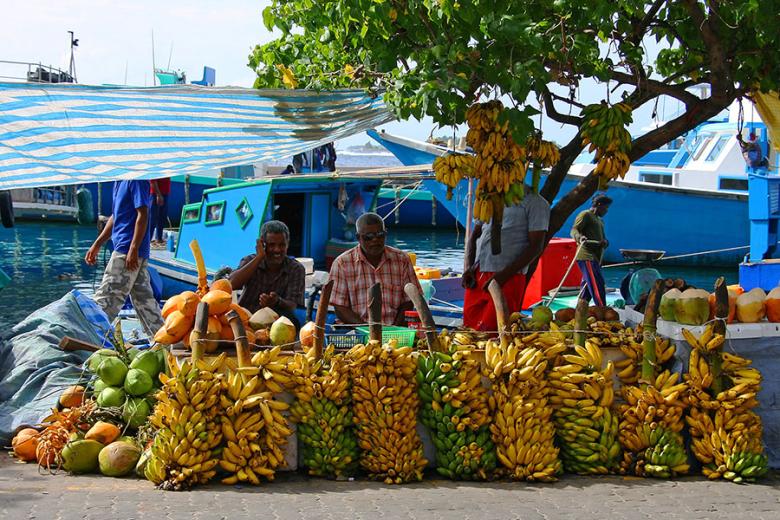
Add a touch of luxury
After my island-hopping adventure, I added a couple of days at an eco-minded island resort. This gave me the chance to unwind in the sunshine with a beer or two. Due to the strict Muslim laws in the Maldives, drinking is not permitted on the local islands, so I’ll admit it was great to have a few cocktails and soak up a bit of luxury. I highly recommend adding a few nights at the end of your island-hopping trip – it will give your holiday the perfect balance.
I visited Bandos Island, a sustainably minded resort close to the airport that contributes to ocean conservation efforts and has a coral nursery of its own. Another great option is Reethi Beach Resort, a pioneer in green initiatives in the Maldives and founder of the Baa Atoll Project, an NGO working for a ban on shark fishing in the atoll. Reethi Beach has also drastically reduced its plastic waste and purchases local produce wherever possible.
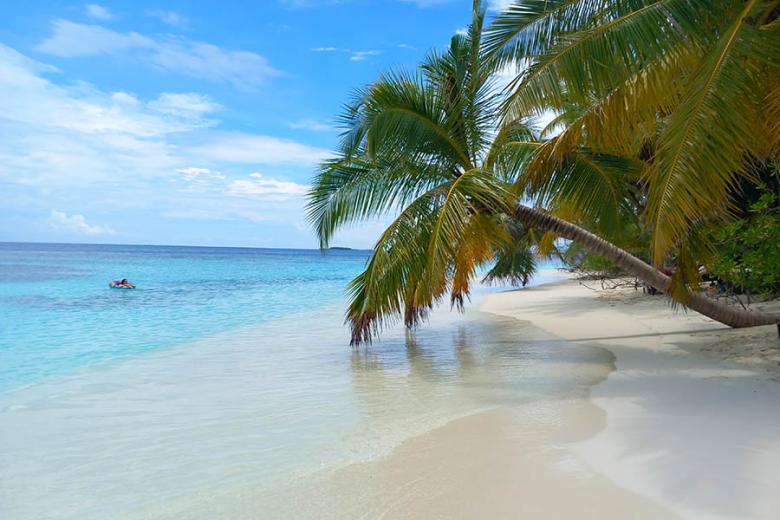
Ready to discover the real Maldives?
We're experts at building bespoke holidays all over the world. If you’re interested in visiting the Maldives we can provide advice and help you arrange every aspect of your trip, with direct or multi-stop flights, transfers, accommodation, vehicle hire, tours and excursions. Simply contact us on 1273 320 580 or request a quote by email.
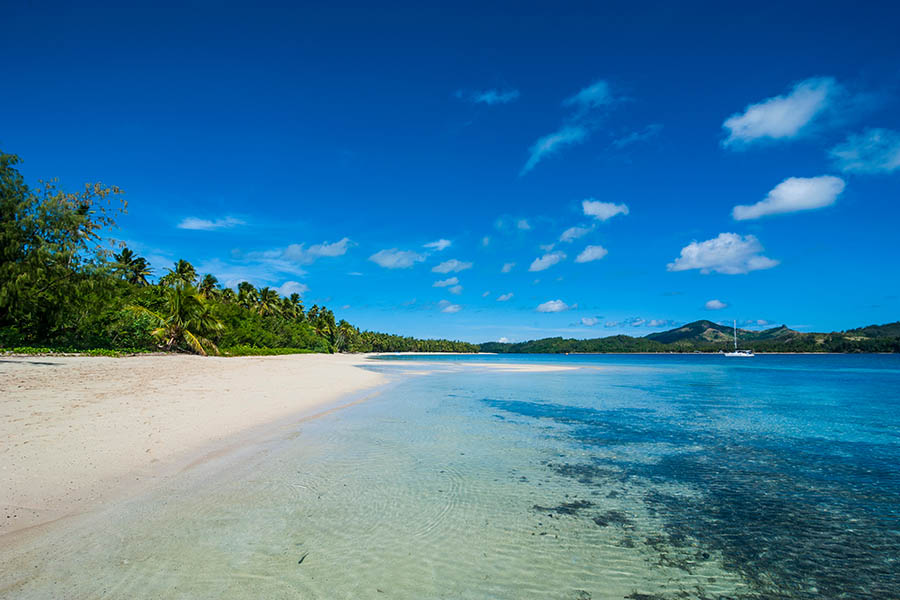
Exploring the Yasawa Islands: my Fiji family holiday
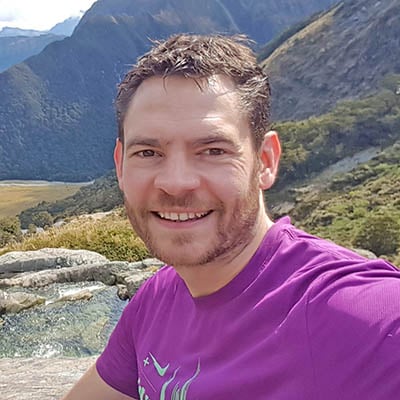
Chris West
Senior Travel Consultant
at Travel Nation
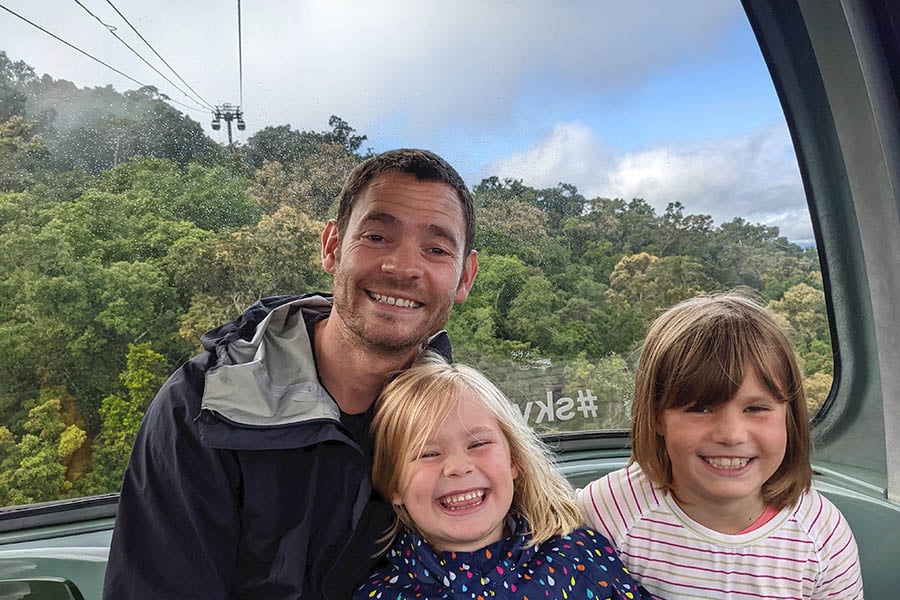
Reef to rainforest: our North Queensland family holiday

Chris West
Senior Travel Consultant
at Travel Nation
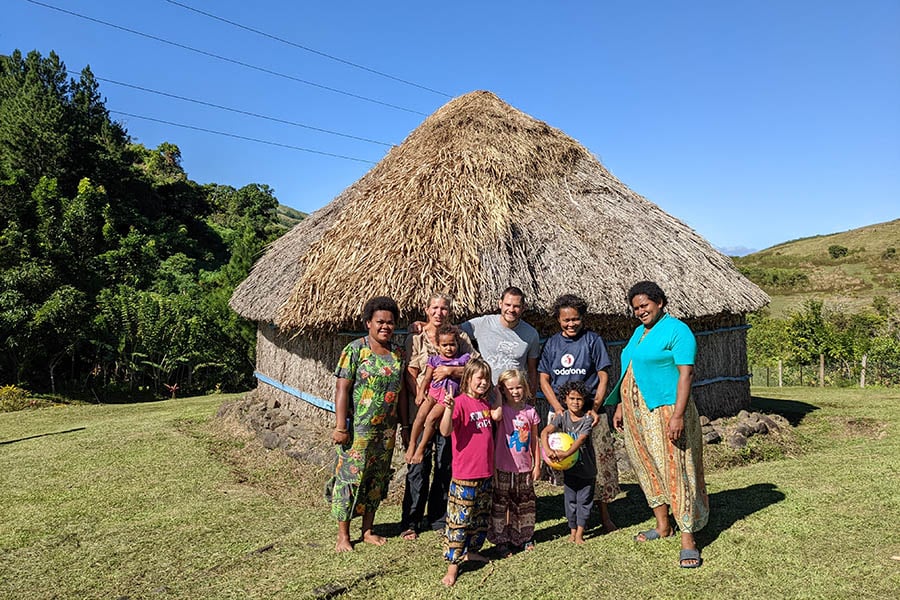
Discovering Viti Levu: our family trip to Fiji

Chris West
Senior Travel Consultant
at Travel Nation

About the author Chris West
Senior Travel Consultant
With his studies in Geography and Master’s degree in development behind him, Chris set off to leave pretty much no mountain unclimbed. His passion for adventure has driven him to climb both Kilimanjaro and Annapurna Base Camp in Nepal and he and his wife have also traversed Canada and all the way down through the Americas by bike! Even starting a family didn’t really slow down Team West, as they took their little daughter on a campervan road trip through the US National Parks. Chris joined Travel Nation as a round the world specialist in 2011 and is also one of our Business Class consultants. He really enjoys helping other families put together trips they’ll never forget.

Last trip:
Uzbekistan